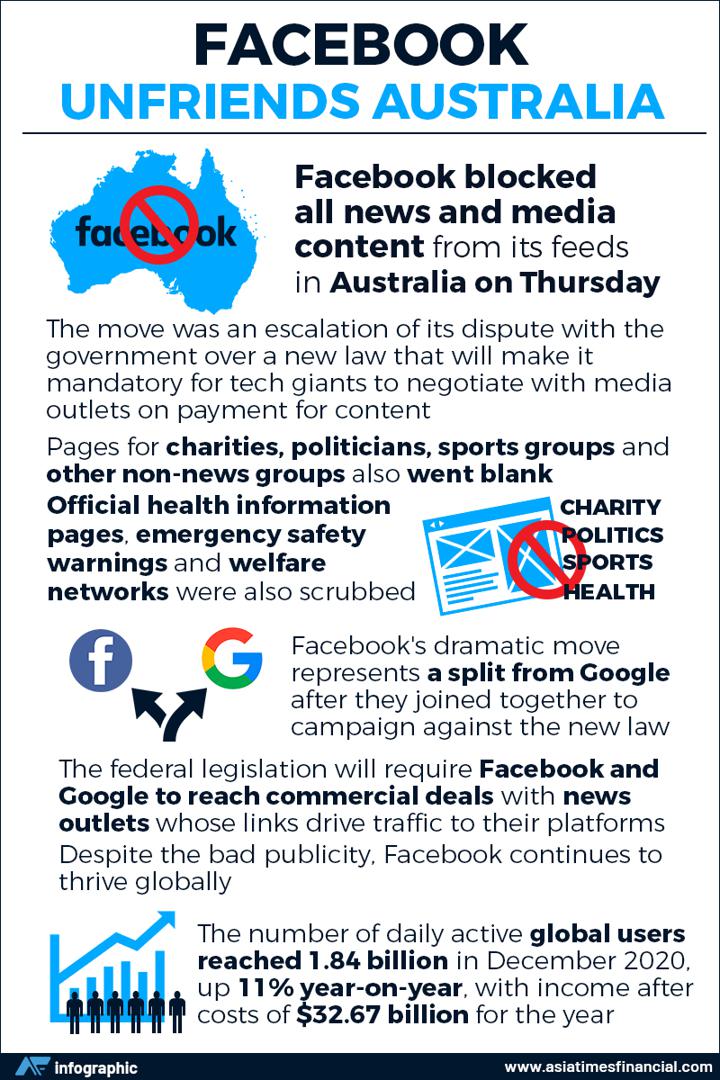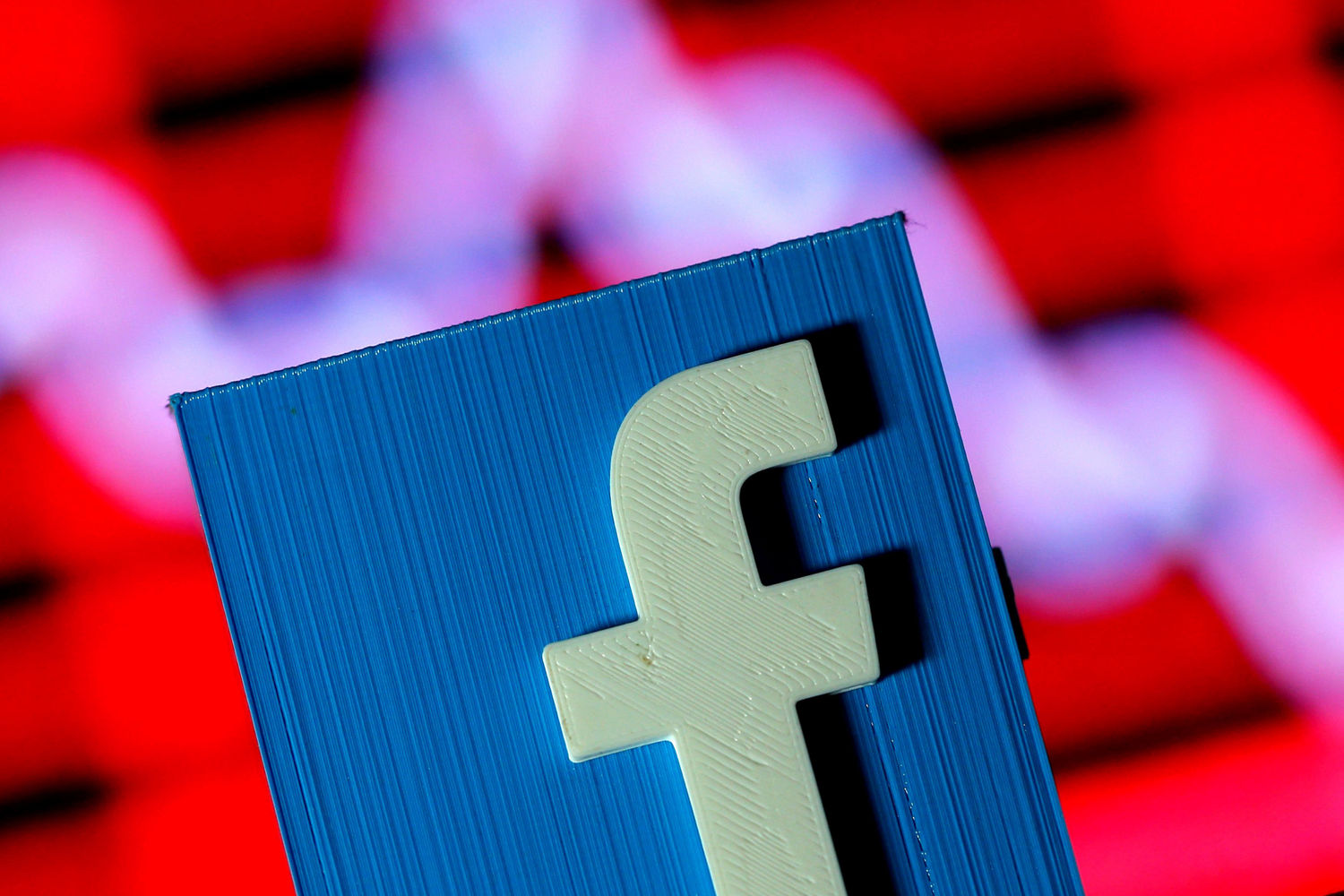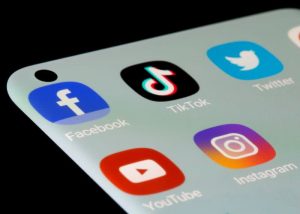(ATF) The Australian government said on Thursday (Feb 18) that vital information on Facebook would be restored, after the social media giant erased local content in an escalating fight with Canberra over payments for news.
The social media giant was widely criticised by politicians and human rights advocates after hundreds of federal, state and local government agencies saw their Facebook content erased overnight.
Many critics pointed out that official health and meteorology information had also been scrubbed during the coronavirus pandemic and at the height of Australia’s summer bushfire season.
“Facebook was wrong, Facebook’s actions were unnecessary, they were heavy-handed, and they will damage its reputation here in Australia,” Treasurer Josh Frydenberg told a televised news conference.
The politician was deeply embarrassed by Facebook’s action, having announced that he and the company’s chief executive, Mark Zuckerberg, had spoken over the weekend about looming laws that will force them to pay local publishers for content.
Frydenberg said neither Zuckerberg nor its Australian management gave any warning of the action to erase Australian content.
BACKLASH LIKELY
Facebook’s tough stand might well turn into an own goal for the much-criticised social media provider.
“There’s been a climate the last two or three years of thinking Facebook isn’t doing as good a job of looking after people as it should,” Tama Leaver, professor of internet studies at the Australian National University (ANU) in Canberra, said.
“I think, whether intentional or not, blocking emergency services websites and things like that in Australia is a really bad idea in a time of bushfires and Covid-19,” Leaver added.
Pages for charities, politicians, sports groups and other non-news organisations were also affected.
“This is an alarming and dangerous turn of events,” said Elaine Pearson, director of the Australian office of Human Rights Watch in Sydney. “Cutting off access to vital information to an entire country in the dead of the night is unconscionable.”
Greg Hunt, Australia’s health minister, said he was “profoundly shocked” that Facebook would take action that would affect health sites, especially in the middle of a global pandemic.
Facebook later released a statement that said these pages had been “inadvertently impacted” and would be reinstated, though it did not give a deadline.
RANDOM APPLICATION
The ban was applied selectively, and possibly randomly, as some organisations said their Facebook pages were working fine. Others were blanked and later restored after contacting Facebook. But it is not clear how they managed to get in touch with the social media giant’s office, or whom they contacted.
“We are aware that some organisations across Australia have had their Facebook pages removed,” the Western Australia (WA) Police Force wrote on Facebook on February 18. “We have been assured by Facebook that this will not impact the WA Police Force Facebook page, or other law enforcement Facebook pages.”
The same state’s Department of Fire and Emergency Services (DFES) lost their content but it was later restored. “The DFES Page was impacted by this morning’s changes to Facebook,” the department’s social media unit wrote. “After working with the team at Facebook, DFES page visibility has been restored and we are able to continue providing the WA community with vital emergency information. #Phew.”
Despite the bad publicity, Facebook continues to thrive globally. Last month. it reported fourth-quarter revenues of $28.1 billion, a year-on-year rise of 33%, with advertising revenue up 31% to $27.2 billion. Both figures were higher than analysts expected.

USER NUMBERS SOAR
The number of daily active global users reached 1.84 billion in December 2020, up 11% year-on-year. Despite a 25% increase in costs and expenses, operating income improved 44% to $12.8 billion. Total costs and expenses were $15.3 billion, with research and development spending rising 34%.
“Facebook’s investment case has been buried under a pile of loud headlines lately,” said Sophie Lund-Yates, equity analyst at Hargreaves Lansdown in London. “The regulatory headwinds, privacy changes and brand safety issues shouldn’t be overlooked, but the business underneath all the PR rubble is still exceptionally strong.”
However, while the company’s economic fundamentals are strong, Facebook’s own social messaging is looking misguided – with the Australian saga a standout example of bad PR.
“Facebook is 17 years old so it’s a petulant late teenager and behaving accordingly, but when you’ve got global communication as part of what happens on your platform, you don’t get to have a strop,” said Leaver at ANU, using the Australian slang term for a temper tantrum.
With reporting by Agence France-Presse and Reuters
























